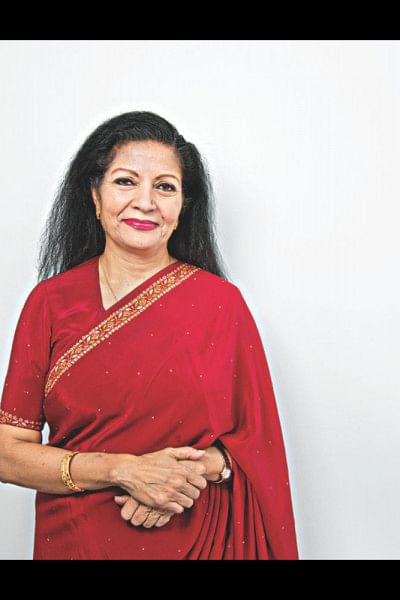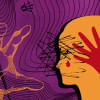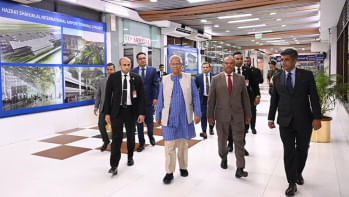Empowered women can resist violence

The theme for this year's 16 Days of Activism is "Leave No One Behind: End Violence against Women and Girls." Does violence affect everyone equally? If not, why?
Gender-based violence can happen to anyone—rich or poor. It happens in trains, buses, public places and inside homes. It does not have any class boundaries. It is a global pandemic. However, it affects women disproportionately; some women and girls are more vulnerable than others. That is why we have to shine a spotlight on those who are more vulnerable, such as women and girls with disabilities, women from ethnic and religious minorities, migrants or refugees in refugee camps, who often face the highest level of discrimination and are at even higher risk of experiencing violence.
Globally, one in three women are affected by violence. In Bangladesh, it is two out of three. Traditionally, violence has been a private domain. It is positive that the states are recognising that they have a duty of care to those experiencing violence. Gender equality and women's empowerment have been recognised as a Sustainable Development Goal. Issues like early childhood marriage and child trafficking have been introduced into Sustainable Development Goals. So this year's theme also underscores one of the essential principles of the 2030 Agenda for Sustainable Development, a commitment to improve the lives of all and address pervasive inequalities and to "reach the furthest behind first."
How, in your opinion, can we end gender-based violence?
The solution should be structured around 4 Ps of violence. 1) Prevention: Through raising awareness and changing social norms through education and economic empowerment. A culture must be established where women and girls must be valued as human beings. 2) Protection: How do we protect women who are particularly vulnerable? How is the law enforcement providing protection services for the survivors of violence and ensuring their safety and dignity? Comprehensive, multi-sectoral services (health, justice and policing, social services, etc.) must be made available for victims and survivors of sexual violence.
In some locations, one-stop crisis centres have been seen to be very effective. But also, we have to constantly think about how we can make this system available to the most vulnerable, those that are farthest to reach—for example, when violence happens in private spaces, refugee camps, rural areas, what are we doing about it? These questions must be addressed. 3) Prosecution: There is a gross under-reporting of cases of gender-based violence, particularly when it comes to rape and sexual abuse, because of the stigma that is attached to it. There is a culture of silence and impunity that needs to change. 4) Participation: Everyone has a critical role to play and must participate to create change. We must speak out against harassment and violence in our workplaces, in our institutions, in our social arenas and through our media, popular culture and mass communication channels.
In addition, economic empowerment of women is critical. When women are economically empowered, they are able to resist violence.
Theoretically, yes. But we observe that there is greater gender parity in education and employment. But also, gender-based violence has increased. What is the reason behind this?
Two things need to be kept in mind. Firstly, intimate partner violence is chronically underreported. There are women who do not report domestic violence and abuse for many reasons including fear of reprisal, lack of support and feelings of shame. So how do we know whether it has increased or decreased, if we had no accurate data to begin with? Yes, it is possible that we now see an increase in violence, but also this could be because the empowered women are now coming out and reporting cases of violence. It is important that the four Ps that I mentioned are met.
Secondly, there has been a shift in gender dynamics. Men are no longer the primary breadwinners. So they are feeling threatened and acting out. We have, for instance, seen this phenomenon in refugee camps, where women are given employment opportunities but men aren't. This shifting power dynamic between genders is causing unrest. But this is no excuse for violence. Women must continue to be empowered.
In recent times, we have come to the realisation that simply engaging women may not be enough. Traditional development interventions have failed to engage men successfully, or deeply enough, in women's rights movements. What can we do, as a society, to ensure that this happens?
It is imperative that we engage men because gender-based violence and gender imparity are based on patriarchy. And patriarchy is pleased with the dominant position of men. Now that this position is being challenged, partnership and solidarity are imperative to ensure that gender imparity is reduced. Various movements like "He for She" has highlighted the role of men and boys in taking leadership in changing gender stereotyping. And in each of the 4 Ps, whether it is prevention, protection, prosecution or participation, it is critical that men and boys are engaged at all levels. Boys should be educated in homes and schools to not think of traditional role models as absolute. In workplaces, a gender-sensitive environment must be ensured. Just as an example, in the law enforcement, when women are recruited, the men there must be educated so they support their colleagues. These institutions must be made gender-sensitive so that when women go to work there, they are met with empathy.
What are the three things that we can do on a priority basis in the fight against violence against women?
Firstly, let us make sure that laws, policies and measures are in place at the national, local and village levels. Laws, policies and measures must be there so that the architecture of the 4 Ps is put in place.
Secondly, let's have dedicated financing to deal with this issue. Gender-based violence is not only a legal issue. It is also related to development as well as human rights. The cost of violence is huge. And poorer countries, in particular, cannot afford this cost. There must be dedicated resources to support the 4 Ps.
And thirdly, movement building. Exposure and outrage at violence must be channelled through movements. Movements must be led firstly by young people. Young men and women can lead change. Institutional champions must be empowered to advocate for gender equality. Faith groups should be included in these movements as well. Religious leaders can play extremely powerful roles in building a movement because people listen to them. We believe no religion can be used as a tool to propagate gender-based violence. Inclusive movement building must be encouraged and sustained. Only then will gender-based violence see an end.
Shagufe Hossain is the founder of Leaping Boundaries and a member of the editorial team at The Daily Star.










Comments